Theresa Smith's Blog, page 3
September 11, 2025
Book Review: Nobody’s Empire by Stuart Murdoch
It’s the early 1990s in Glasgow, and Stephen – music loving romantic – has emerged from a lengthy hospital stay diagnosed with chronic fatigue syndrome, a little-understood disease that has robbed him of any prospects of work, a social life or independent living. Meeting fellow strugglers, who the world seems to care less and less for, they form their own support group and try to get by as cheaply and as painlessly as possible.
Finding that he has the ability to write songs, albeit in a slow and fledgling way, Stephen wakes to the possibility of a spiritual life beyond the everyday. Leaving Glasgow in search of a cure in the mythic warmth of California, Stephen and his friend Richard float between hostels, sofas, and park benches. Could the trip really offer them both a new-world reinvention?
Released October 2024
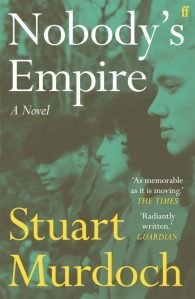 My Thoughts:
My Thoughts:I should probably state upfront that I had no idea going into this book who Belle and Sebastian were, so it’s safe to say, I didn’t select this novel based upon being a fan of Stuart Murdoch and his music. What I did choose it for, was that I am always interested in novels that deep dive into chronic illness. Nobody’s Empire is auto-fiction, written in first person narrative, so it was anybody’s guess as to how I was going to go with this one. In the end, it was a mixed bag, and I have rated it 3.5 stars, but it came close, so close, to being more than that.
This novel has a lot of shining moments that set it apart and affected me greatly. Stuart is of course writing about his own experiences of living with chronic fatigue syndrome, and this is not lost on the reader with the physical and emotional depth he offers about the illness and his character’s experiences of it.
This is very much a coming-of-age story underpinned with strong themes of friendship and connection. Stephen’s friendship with Carrie, who is also living with chronic fatigue was a particularly beautiful relationship and their connection and mutual respect was so well articulated. It’s in these relationships between all of the characters that the novel succeeds. So many moments that were funny, deeply moving, and life affirming. I felt this novel was less about making people understand what living with chronic fatigue must be like and more about being a story that people who do live with it can relate to, and I honestly loved it for that.
Where this novel fell down for me is in the actual writing. It’s just not very well written, and hand in hand with this, it’s not very well edited either. It waffles and winds about and goes off on tangents about God and music for pages and pages, and really, I felt at times like I was reading a first draft. It had a distinct feeling of ‘this is written by somebody famous so he can write what he likes’ about it. I tired of it at times, to be honest, and there was a fair bit of skimming over in certain sections. I think it could have been 100 pages less and far tighter for a good edit and then it would have been a 4.5 star read for me instead of a generously bestowed 3.5 stars.
September 6, 2025
Book Review: Love Forms by Claire Adam
In the heart-aching new novel from the author of the award–winning Golden Child, a mother searches for the daughter she left behind a lifetime ago.
Trinidad, 1980: Dawn Bishop, aged 16, leaves her home and journeys across the sea to Venezuela. There, she gives birth to a baby girl and leaves her with nuns to be given up for adoption.
Dawn tries to carry on with her life – a move to England, a marriage, a career, two sons, a divorce – but through it all, she still thinks of the child she had in Venezuela, and of what might have been.
Then, forty years later, a woman from an internet forum gets in touch. She says that she might be Dawn’s long-lost daughter, stirring up a complicated mix of feelings: could this be the person to give form to all the love and care a mother has left to offer?
Longlisted for the Booker Prize 2025
Released June 2025
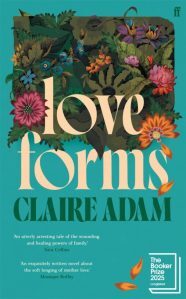 My Thoughts:
My Thoughts:Love Forms by Claire Adam is my second read from the 2025 Booker Longlist, and I thoroughly enjoyed it. It’s a quiet meditation on a woman’s search for her daughter, whom she gave up for adoption when she was sixteen, as well as for meaning and acceptance of this decision, which has haunted her for more than forty years.
Much of the novel is set in Trinidad, and I loved this setting, one that I had not previously encountered before. My geography was a little rusty so I had to look up exactly where it was, in terms of its location within the Caribbean and proximity to South America, as the characters frequently went to Venezuela for all manner of reasons from employment to shopping. Trinidad and the way of life there came to life within this story, the culture, the political landscape, crime within the region, and the disparity of wealth. The author also writes the narrative in a Trinidadian dialect, which again, added to the overall atmosphere of the story.
‘Each click of the shutter is like a little reminder: we’re all here together now, we’re happy now; now is a moment that will never come again.’
This is a story of adoption, specifically from the mother perspective, but it differs to any others I’ve read because of the nature of these adoptions. Girls being sent to another country, in secret, their babies then adopted out to other countries again through the church, not necessarily legally. The impossibility of ever finding the child given up was demonstrated through Dawn’s experiences with her decades long failed searches and the desperate lengths that many were going to on the back of false hopes. It really was rather heartbreaking.
There is a lot about family in this novel, particularly Dawn’s relationship with her mother and father into adulthood once she married and began having further children. There was shame intermingled with regret, but also exasperation evident, that Dawn should even care when she had so much else in her life. And yet, as her mother reached old age, there also seemed to be an acceptance of Dawn’s desire to find her lost child, and even an eventual supporting of it. The characters were all so vividly realised within this story, their individual personalities and relationships with Dawn deeply explored. Dawn’s relationship with both of her sons was lovely and I appreciated how protective of her they were and the support they demonstrated for her with her ongoing search. Again, both sons were individualised, as were their relationships with their mother. There was so much thought and care put into all of these characters and their interactions with each other.
‘Maybe my story wasn’t: Dawn, who made a mistake and brought shame to her family. Maybe it’s: Dawn, mortal woman, who took a wrong turn in life and got lost.’
I found Love Forms to be a restful and reflective read, with beautifully phrased passages throughout that I’m still thinking about days after finishing. I have no idea what qualifies a novel for a Booker listing, but I am glad this one was listed as it’s not generally a novel I would have heard of otherwise, much less read. I highly recommend this one, it has so much to offer readers.
Elizabeth Harrower: A Few Days in the Country and Other Stories
Internationally acclaimed for her five brilliant novels, Elizabeth Harrower is also the author of a small body of short fiction. A Few Days in the Country brings together for the first time her stories published in Australian journals in the 1960s and 1970s, along with those from her archives—including ‘Alice’, published for the first time in 2015 in the New Yorker.
Essential reading for Harrower fans, these finely turned pieces show a broader range than the novels, ranging from caustic satires to gentler explorations of friendship.
Stories in this Collection:The Fun of the Fair
Alice
The City at Night
Summertime
The North Sea
The Cornucopia
The Beautiful Climate
Lance Harper, His Story
The Cost of Things
English Lesson
It Is Margaret
A Few Days in the Country
Joint winner, University of Southern Queensland Australian Short Story Collection – Steele Rudd Award, 2016
Shortlisted, The Stella Prize, 2016
Shortlisted, Kibble Literary Award, 2016
Shortlisted, Western Australian Premier’s Book Award for Fiction, 2016
Longlisted, Colin Roderick Award, 2016
Released March 2016
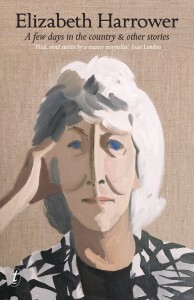 My Thoughts:
My Thoughts:A Few Days in the Country and Other Stories by Elizabeth Harrower is one I picked up on a whim this week for two reasons: my Elizabeth Harrower reading immersion and as a #shortstoryseptember contribution. I had intended on reading this collection after I had finished all of her novels – I have three remaining to be read – but Lisa at ANZ LitLovers LitBlog is hosting Short Story September, and I immediately thought, oh, I have just the thing for this. And indeed, this collection fit the criteria perfectly. Each of the stories can be read in under an hour, which was pretty much the criteria, so thanks to Lisa for keeping it simple!
There are twelve short stories in this collection. At least two are most definitely autobiographical – The Beautiful Climate and It Is Margaret. While some bear the same stifling atmosphere as her novels, others have a different tone and focus, and it was so refreshing to experience this range in Harrower’s writing. You get glimpses of this in her novels of course, but that can be overshadowed and buried by the more urgent thematic aspects of her work. All of the stories have themes that explore the socio-political landscape of Australia in the post-war era, which is of course characteristic of her work, with the divides between class in our ‘classless’ society an ever-present topic of exploration for her, and she does this deftly within the contexts of friendships, marriages, and access to education. Personally, it is this focus within her work that I gravitate to and devour from a social history point of view. It was wonderful to find this so prevalent throughout these short stories.
I didn’t really read these with an intent on reviewing the stories individually, I was more just immersing myself into Harrower’s work within a different form. Each story has its own impact but if I am to be specific, I liked The North Sea for its themes of hope as the character is taking a break on the Scottish coast as she steps from one life into another. Lance Harper, His Story was a standout for me, about a young man who is seeking an answer to the question: What is a Classic? In this story, we see the barriers to education and classism within Australia on show. The last story in the collection, A Few Days in the Country, about a young woman who has gone to stay in the country for what appears to be a wellness break, but she has brought someone else with her, suicide, which Harrower writes as its own character. This story was written with such empathy and the kind of insight that only comes from knowing something intimately yourself. I found it a deeply affecting, but also intensely sad story for the collection to end on.
If you’ve never read Elizabeth Harrower before and would like to dip a toe in, these stories are a brilliant introduction to her work. This quote that I am ending on, to me, perfectly encapsulates the very meaning of what it is that Harrower seems to be always asking, in all of her writing.
‘Here it was again – the mystery that pursued her through life in one form, in another, returning and returning, presenting itself relentlessly for her solution: how should human beings treat each other?’
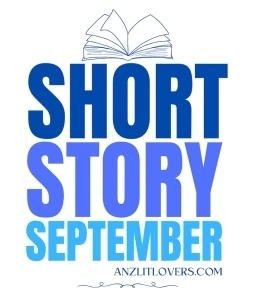
August 28, 2025
Book Review: Four Letters of Love by Niall Williams
Nicholas Coughlan and Isabel Gore are meant for each other they just don’t know it yet. Though each has found both heartache and joy in the wild Irish landscape, their paths are yet to cross. But as God, ghosts, fate and the sheer power of true love pull Nicholas and Isabel together, so too does life threaten to tear them apart.
Published by Pan Macmillan Australia
Released May 1998
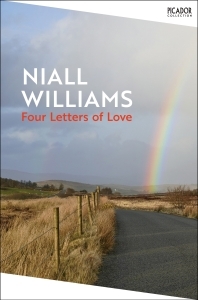 My Thoughts:
My Thoughts:I had never read Niall Williams before and after skimming over reviews on this one, Four Letters of Love, it seemed very much my sort of read. Unfortunately, this novel has just become the first Irish fiction I have not gotten along with. I started out listening to it on audio but found it quite difficult to keep track of, so I borrowed an eBook copy from the library and started to do a bit of a tandem read, however, each time I listened, I found myself needing to go back over those passages in the eBook to almost, translate them for myself, for want of a better description. So, you see how this has gone. I was needing to read a book twice to make heads or tails of it.
I will not deny that Niall Williams writes passages of beautiful prose. And I am usually a big fan of lyrical and poetic imagery conjured with words, along with a bit of waffling on the side. But this novel was too much, even for me. Because it wasn’t restricted to impacting passages designed to stop the reader, steal their breath, or move them to tears. It was every sentence, and it just became too much. Over and over, I had moments of just thinking, what is he even going on about. It became hard going and there were many times I considered abandoning it. The only reason I didn’t, ironically, was because it hadn’t gotten to the point yet and I wanted to experience this so-called magnificence that so many people had raved about.
So, onto the magnificence. Well, it never happened, at least, not for me. The entire point of the novel, if you go by the book description, was the love story between Nicholas and Isabel. They never once appear in a scene together, and they don’t even know about each other until the last 50 pages or so of the novel. In terms of love stories, this was a massive let down and getting to the end of it was a relief but also put me in a very bad mood. Yes, there’s all these other things going on along the way, tragedies mostly, and divine moments which got a little tiresome. But ultimately, this novel did not deliver on what it promised, and I wish I’d never started it.
August 22, 2025
Book Review: Nora Webster by Colm Tóibín
It is the late 1960s in Ireland. Nora Webster is living in a small town, looking after her four children, trying to rebuild her life after the death of her husband. She is fiercely intelligent, at times difficult and impatient, at times kind, but she is trapped by her circumstances, and waiting for any chance which will lift her beyond them.
Slowly, through the gift of music and the power of friendship, she finds a glimmer of hope and a way of starting again. As the dynamic of the family changes, she seems both fiercely self-possessed but also a figure of great moral ambiguity, making her one of the most memorable heroines in contemporary fiction.
The portrait that is painted in the years that follow is harrowing, piercingly insightful, always tender and deeply true. Nora Webster is a novel that illuminates our own lives in a way that is rare in literature. Its humanity and compassion forge an unforgettable reading experience.
Published by Pan Macmillan Australia
Released February 2015
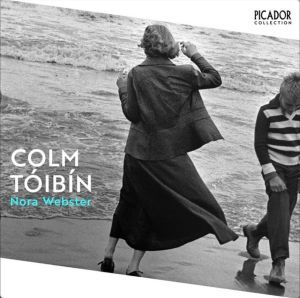 My Thoughts:
My Thoughts:After a very good audiobook followed by two non-starters, I needed something that was going to be a guaranteed good read for my next one, and in Nora Webster, I not only found that, but I also found what might just be the most perfect novel in existence. Already a Tóibín fan, with the previous three of his I’ve read all coming in at five stars, this one has nudged itself into the top spot as my favourite by him, but also, now, one of my favourite novels of all time.
‘She thought of the book she had bought in Dublin. She could not remember what had made her buy it. She went out to the kitchen and searched for it in her bag. As soon as she opened the book she put it down again. She closed her eyes. In future, she hoped, fewer people would call. In future, once the boys went to bed, she might have the house to herself more often. She would learn how to spend these hours. In the peace of these winter evenings, she would work out how she was going to live.’
Nora Webster, so named after the main character of this story, is a novel of grief, of piecing your life back together after the death of a husband and father, the breadwinner, the glue that held the family together. We step into the lives of the Webster family six months on from the tragic loss of Maurice to heart disease, and we remain with them for several years on. Nora is living in the family home with the two youngest, sons, who are on the cusp of their teenage years, and the two eldest, daughters, are living away from home, one at boarding school, the other at a training college for teachers. Nora is emotionally supported by her late husband’s brother and sister, who are both unmarried and childless and generous with their attention and financial support for the children. Her relationship with her own sisters is more fraught, but her aunt Josie, who is her late mother’s sister, is supportive and was the one who cared for the boys in the months that Maurice was dying while Nora was with him throughout. Moving forward, Nora needs to find employment, as her widow’s pension is not sufficient to live on.
‘She wondered for a second if all the years of being away from work, the years spend cooking and cleaning the house and looking after the children and then being with Maurice when he was sick had affected her ability to keep her mind on the same single thing.’
And so begins a story of piecing one’s life back together after tragedy, but with a new picture taking shape from the broken pieces. Learning to be a family anew, making new friends and developing new interests to fill the void of a person no longer there and hours upon hours to spare. That fine line between despair born out of grief along with happiness in newly discovered connections and interests. The way that Nora began to get to know herself, as a person as well as a single parent, was a gentle unfolding that I felt enormously appreciative of.
‘So this was what being alone was like, she thought. It was not the solitude she had been going through, not the moments when she felt his death like a shock to her system, as though she had been in a car accident, it was this wandering in a sea of people with the anchor lifted, and all of it oddly pointless and confusing.‘
Against this backdrop of domesticity, so much more is conveyed about other people, the community, Ireland itself, and even Northern Ireland. Nora encounters issues at work and becomes part of a trade union movement, and then there’s the escalation of violence in Derry and Belfast, which is captivating all of Ireland each time it hits the news, and draws Nora’s second eldest daughter into its realm as she joins protests in Dublin. There are conversations between people, thoughts and processing about life and the community, politics and religion. This is what Tóibín does, he creates a universe and enfolds you within it with his clear and precise words, his finely drawn characters, his colourful Ireland.
‘Well, it’s funny, isn’t it?’ Aine asked. ‘The Irish Army can go to the Congo and to Cyprus, but it can’t go into Derry to help our own people.’
Throughout reading this novel, I was struck over and over how much empathy Tóibín writes with, particularly in his women. Nora was the most beautiful mother, by no means perfect, often second guessing herself, but motivated by love and acting primarily with instinct and restraint, particularly with her sons. I felt so much love poured into Nora by Tóibín, that it came as no surprise, and such a delight, to discover that Nora Webster was written as a tribute to his own mother. Other women were written with such empathy and intent, Josie, Phyllis, Laurie, and Sister Thomas. I do want to give a little shout out to Sister Thomas, who was divine, in every sense of the word.
‘It occurred to her that in any other century, Sister Thomas would have been burned as a witch.’
If you have never read Colm Tóibín, I would encourage you to begin with Nora Webster. It is him at his finest, at his most accessible and comforting, and reading this novel brought me so much joy, even through the sad parts. Nora Webster is literary perfection, an absolute darling of a novel that I will hold close to my heart and widely recommend to all.
‘She knelt down and slowly fed the letters into the fire. She thought about how much had happened since they were written and how much they belonged to a time that was over now and would not come back. It was the way things were; it was the way things had worked out.’
August 15, 2025
Book Review: Audition by Katie Kitamura
Two people meet for lunch in a Manhattan restaurant. She’s an accomplished actress in rehearsals for an upcoming premiere. He’s attractive, troubling, young – young enough to be her son. Who is he to her, and who is she to him? In this compulsively readable, brilliantly constructed novel, two competing narratives unspool, rewriting our understanding of the roles we play every day – partner, parent, creator, muse – and the truths every performance masks, especially from those who think they know us most intimately.
Taut and hypnotic, Audition is Katie Kitamura at her virtuosic best.
Released April 2025
Longlisted for The Booker Prize 2025
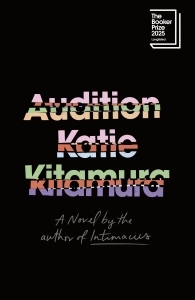 My Thoughts:
My Thoughts:Audition is the first of my Booker reads from this year’s longlist. There are quite a few titles on the longlist that I’m keen to read and I feel like this is the first time in years that I’ve been so enthusiastic about a single longlist. I was sent Audition a few months ago for review, prior to its longlisting, but it sat in my inbox unread because it was provided as a protected PDF file, not a book, and the challenges with reading on my phone and having to enter a password each time I opened it deterred me from even starting it. Last week though, I listened to Julia Gillard’s book club episode on her podcast (A Podcast of One’s Own) covering Audition and the discussion there was enough to prompt me to find a work around for reading – I just printed it. I refuse to buy a book I already have, and the library wait was too long. Was it worth it? Yes. Entirely.
‘People always talked about having children as an event, as a thing that took place, they forgot that not having children was also something that took place, that is to say it wasn’t a question of absence, a question of lack, it had its own presence in the world, it was its own event.’
Audition is not a long novel, coming in at just on 200 pages. It’s fast paced and has a building element of dread that had me reading late into the night, reluctant to put it down. Split into two parts, initially I thought this was a sliding doors type of story in its structure, the first part representing one viewpoint on the character’s life, the second part offering an alternative version. It wasn’t until I was almost at the end of the novel that I realised this was not the case at all, and that it was instead, an incredibly clever form of meta fiction. Going back and transcribing the quotes I wanted to include here, I noted as well in the next one below, that there were hints along the way that I missed. I feel like you could read this novel a second time knowing it was meta fiction and find many more things in it that were possibly missed on the first read. I love a well written meta novel and it’s been a long time since I’ve come across one, so this was a delight to discover and added to my overall feelings of enjoyment for this read.
‘Xavier gave good son. He loved the part of it, he longed for the role, that was why he had contacted me in the first place. He was now giving good son to Anne, and she was responding, and through that mutuality a membrane had formed around them.’
The main character in Audition is an actress, married and childless. At its heart, it is a story of marriage and the life that unfolds with another person whom you share your everyday life with. All parts of the story circled back to this, even the sections that focused on her career and unpacked motherhood. I enjoyed the way Katie Kitamura wrote of the main character’s knowing of her husband, the depth of it and the security she obtained from this one sure thing in her life. The times when this began to show a crack, that perhaps she didn’t know him as well as she thought, were deeply emotional moments for the character and were written with such startling exposure.
‘As I walked down the street, I was suddenly overwhelmed by a newfound awareness of the life we had together, Tomas and me. It was one we had built over the course of our marriage, and it bore the texture of many shared intimacies and affinities, a weave so tight that it seemed impossible that it could accommodate another person.’
~~~~
‘For so many years there had been the tacit understanding that I contained the threat to the marriage, that it was housed inside me. And for all those years I had tamped down every impulse to stray, I had lived inside a straightjacket of my own devising, and I had remained true. But in the end, he was the first to tire of the marriage, he was the first to look outside, to open the door and taste the fresh and free air. He was the first, and he was always bound to be the first, because of course I needed him, I needed Thomas, much more than he needed me, and this had always been the case, whether I was able to admit it or not. It was him, and it was always going to be him.’
There is so much I would like to write about in this review but all of it would simply spoil the story for everyone else and this is the type of novel you want to go into knowing as little as possible about, for a full appreciation of the meta-aspect and the author’s intent. As far as Booker listed titles go, it is incredibly readable, and I found that so refreshing. My Booker reads in recent years have been very hit and miss, with readability a big reason for this. I’m all for thinking while reading but if I have to work too hard for it, it becomes a chore and just exhausts me. It’s a delicate balance and I’m a very fussy reader. I hope to see Audition on the shortlist, even though it’s the first one of the longlist I have read, the style alone in my opinion makes it worthy of a spot.
‘Here, it is possible to be two things at once. Not a splitting of personality or psyche, but the natural superimposition of one mind on top of another mind.’
Thanks to the publisher for the review copy.
August 9, 2025
Elizabeth Harrower: The Long Prospect
The Long Prospect is Elizabeth Harrower’s second novel, published in 1958. It is set in a fictional town called Ballowra, which is loosely based on Newcastle. I didn’t get quite the same sense of place with this one as I did with Down in the City, but perhaps Harrower shines brighter in this aspect when she is writing about places she has lived in. The setting for this one does however have significant influence on the characters and this is reflected in the way Harrower has written them. Specifically, if you consider Lilian, the villainous matriarch of this story, she is very much a big fish in a little pond, and her followers are all different shades of shallow based on their position in the pecking order of Lilian’s social circle. Having lived in regional towns for the majority of my life, I found these characters entirely recognisable, despite the fact that again, this is a story published 67 years ago.
‘It was impossible to know what reaction, if any, Lilian had expected. She was unable to think before she spoke, and therefore unable to plan ahead. But instinctive presumption and lack of feeling led to her displaying a callousness which in itself, distinct from what was said, appalled the heart.’
In The Long Prospect, Harrower’s gaze shifts from the relationship of marriage to that of child and caregiver. Emily is in the care of her grandmother Lilian because her parents were ill suited, got married without knowing each other, had a baby immediately and then went their separate ways. Lilian then set up her daughter, Emily’s mother, in Sydney with a share in a shop and kept the child with her. Emily’s parents remain married, but always apart in a farcical arrangement that appears to benefit no one, and they each see Emily separately on occasion, her father less often than her mother, but neither of them with any regularity nor enthusiasm. So, this is where we step into this story, where Emily is in the care of her grandmother, who runs a boarding house, and who is essentially an incredibly cruel woman who spends the majority of her time chasing other women’s husbands and hosting parties that appear to involve cards and heavy drinking, with the swapping of partners to cap off the evening. During these parties, Emily is ignored, but present and left to her own devices, perfecting her ability to remain invisible.
‘Three times she had resisted the appeal of Thea’s outstretched hand lest her grandmother should be reminded of her existence and send her away. But still she was near, seeing, listening...’
The psychological abuse that Lilian heaps onto Emily is witnessed by many, yet barely anyone calls Lilian out for it. Only once, in the entire novel, does Paula, Emily’s mother, say ‘Mum, don’t speak to her that way’, but she is ignored, and then goes back to her life in Sydney, leaving Emily at the mercy of Lilian. Let’s take a beat to acknowledge that Paula knows full well what her mother is like and has chosen to remove herself from Lilian’s influence, even if this means the sacrifice of her own daughter to achieve her means of independence. In The Long Prospect, Harrower is not simply portraying a case of child abuse and asking us to bear witness. What she is doing is demonstrating the toxic existence of women who despise their own daughters and granddaughters. It’s a hideous morphing of women hating women. And in the complex way that truly manipulative people operate, Lilian will despise Emily, but she will also not allow anyone else to, creating that vacuum where the abused feels championed by their abuser. Anyone who has lived experience of this will understand the complexities of untangling yourself from such toxicity and undoing the influence it has had on your life, particularly if this has taken place during your formative years. There is a scene where Emily’s father arrives unexpectedly and comes upon her in the street with her friend and comments to Emily that her neck is dirty. Before he has a chance to reach the house and see Lilian, Emily races back to tell her grandmother that he is here and what he has said to her.
‘My God!’ She drew a deep exasperated breath. ‘Isn’t that just like the thing.’ She glanced at the open front door. ‘And he said your neck was dirty?’
‘Yes, and it isn’t!’ cried Emily, triumphant. She had told on him.
The arrival of Max as a boarder changes Emily’s life and for the year he is there, she is seen in a way that she never has been seen before. All of a sudden, there is an adult who is taking an interest in her, teaching her things, ensuring she eats, goes to bed on time, has a routine. He even takes her to multiple appointments to the dentist to get her teeth fixed, which of course are decayed through neglect. There is nothing sinister in Max’s motivations, he is man who is witnessing neglect within a house in which he boards, and he decides to do something about it. For Lilian, this suits her just fine, Emily is occupied, and the presence of Max within her boarding house serves a purpose for her in that it provides leverage with which to make her current lover jealous. This is how Lilian rolls, she is a total narcissist and chooses to see only what is of immediate interest to her. For Emily though, her life is changed and improved beyond measure.
‘It was marvellously cheering. And to know that she, Emily Lawrence, whose name alone -Emily Lawrence – could sound like a phrase meaning stupid and lazy, was thought to be worthy of Max’s thought, made her eye herself in the mirror with an altogether new respect. And because she was no longer expected to strive and care for herself alone – to be healthy, to work, to succeed, to be clean and much more for her own sake alone – from matters of simplest hygiene to the most complex matters of thought within her youthful capacity she made great efforts and progress.’
As the reader, we all know where this headed. This is a small town filled with small minds who are fuelled by jealousy and competitiveness. When the inevitable fall out occurs, I felt hollowed out by it. I wanted something different for Emily. Max was so dignified in his handling of the accusations levelled at him and so sensitive to protecting Emily from the worst of it and trying to ensure that she understood that his leaving was necessary, but that she should continue with her learning and striving, to trust people, but also to not trust them with everything. His exasperation with the entire situation just leapt off the page, it was incredibly emotive writing. You just know that Max knows that life could go either way for Emily, coming from the household she is in, and the randomness of which way this may go was despairing for him.
‘How is it possible, Max wondered, giving way to moody generalisations, that the idea of progress can survive in the face of the evidence supplied by human nature?’
Another aspect of this novel that was well articulated was the illustration of the many facets of neglect. Emily does have food, she has clothes and is not expected to do anything to contribute to the household, leaving her to roam and play and do much of what she wants. She’s given money for the pictures, for magazines and lollies, and to her friends, it seems like she has the best life.
‘Don’t you ever do your own ironing?’ Patty asked, knowing.
‘No.’
‘Don’t you know how?’
‘No.’
‘You’re spoilt, aren’t you?’
With an effort, Emily threw up a tinny unconvincing smile. The unexpectedness of this small attack momentarily knocked her off balance, deprived her of another unit of energy, almost, it might fancifully have been felt, lessened her chances of survival.’
And that right there, was Lilian’s alibi. How could anyone accuse her of neglecting her granddaughter. Didn’t the girl have all she needed and then some? Didn’t she get five-pound notes pushed into her hand regularly so she could treat herself and her friends to whatever they liked? And as is the way of most people who never look beyond the surface, indeed, Lilian was doing a great job, taking care of her granddaughter when she didn’t have to, but she chose to, because isn’t that just the type of person she is? The insidiousness of it was all pervading. When we depart this story, it is with a sense of despair, because there is no happy ending, Emily is only thirteen, she still has years of living within this family before she can break free, if she even decides to. She has been moved to live with her parents in Sydney, who have reunited and intend on trying to live as a family for the first time ever. It won’t last, we know this as readers, as the novel ends with this line:
‘Paula giggled and raised her brows, sending a woman’s glances to the young girl beside her in the hope that she would respond and join her in the fascinating, necessary game of teasing Harry.’
We know that this will end before too long, Paula will leave Harry, Harry will leave Sydney and return to the country where he most feels at home, and Emily will return to Lilian.
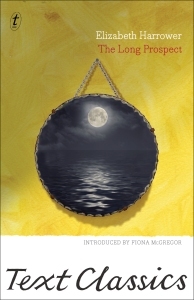
The Long Prospect is book two of my immersion into the works of Elizabeth Harrower, whereby I am reading her novels in order of publication and will finish with her short story collection.
August 5, 2025
Book Review: The Homemade God by Rachel Joyce
Set against the wild backdrop of an intense heatwave in Europe, this is a story about sibling relationships – what holds a family together and what might fracture it forever.
Family is everything, even when it falls apart.
There is a heatwave across Europe. Goose and his three sisters gather at the family’s house by Lake Orta in Piedmont, Italy. Their father, a famous artist, has recently remarried a much younger woman and decamped to Italy to finish his masterpiece. Now he is dead and there is no sign of a painting.
Alhough the siblings have always been close, as they search for answers over that summer, the things they learn – about themselves, their father and their new stepmother – will drive them apart before they can come to any kind of understanding of what their father’s legacy truly is.
Extraordinarily compelling, at heart this is a novel about sibling relationships and those hairline cracks that can appear within a family: what happens when they splinter, and what it would take to mend them.
Released April 2025
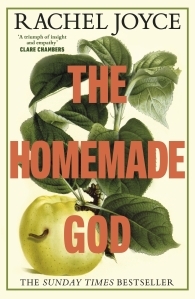 My Thoughts:
My Thoughts:This is the sort of novel that sneaks up on you when you least suspect it with its impact. Rachel Joyce has been on my to read pile with a number of her novels for quite some time now, but I finally committed to reading one, her latest, after a friend of mutual reading tastes messaged me about its brilliance. She was right, she often is, it was brilliant, and I adored it.
‘Not acknowledging what you love is a form of self-sabotage.’
The Homemade God is a novel about four siblings, three sisters and one brother, who have grown up motherless, with a father who is an artist, an alcoholic, a philanderer, and above all, a man who is in love with his own perceived greatness, even if this is at the detriment of his children. I despised him. There was little about him that I felt was good, and as the story unfolded and the history of the family was shaken out, I felt more and more strongly set against him.
‘How could you be such a stranger to your own story?’
Rachel Joyce has crafted these immense characters in this story, each of whom were perfectly imperfect, so human in their thoughts and feelings, their frailties and strengths. While I found something in each of the siblings to like and feel invested about, it was Netta and Goose who stole the show for me. Netta for her strength as the eldest sibling and Goose, well, Goose was a whole other story. Vic’s betrayal of Goose eclipsed all else that he had done, what he did to his son, what he continued to do for years, was shocking and heartbreaking, and yet, out of all of the siblings, it was Goose who stepped up and took care of everything for the family at the end. He was a magnificent character, written in the manner of immortality that only the very best of characters evolve into.
‘In yellow washing Vic’s picture, Goose finally let go of the father they’d all wanted him to be, and in letting go, he discovered it was in him to love the broken man who remained.’
The Homemade God is a novel of such deep feeling and love, despite its themes of grief. It’s often funny, but in that brittle way that hints at trauma and heartache. I highly recommend the audio book, it was hard to stop listening, that’s how engrossing it was, and also, it was narrated by the author herself, who did a splendid job with it. I’ve been left with a book hangover and a longing for more time with this family.
August 1, 2025
Elizabeth Harrower: Down in the City
Down in the City is Elizabeth Harrower’s first novel, published in 1957. It tells the story of Esther Prescott, a sheltered woman who has grown up wealthy and motherless, who marries a man after only knowing him for two weeks, thus leaving her Rose Bay family home to live in a flat in Kings Cross. Harrower is best known for her fourth novel, The Watch Tower, but to only consider that novel is to overlook the unfolding of her talent, her ability to convey so much with a mere line or a certain character gesture. Her writing is so precise, not just with the words she chooses, but with her punctuation, her sentence structure, and above all, her dialogue, which is layered and impactful.
‘He was too old to cry. He had not cried when he was a very small boy and he was not going to start now. But tomorrow he would tell her that he would truly die for her – that he would not let a cold wind blow on her if he could help it.’
Harrower wrote Down in the City while living abroad in London and I feel like this is evidenced in the way she writes of Sydney throughout the novel. Sydney is its own character, the places, the seasons, the ebb and flow of life bursting out of its neighbourhoods. I had a sense of her, if not feeling homesick for Sydney, then nostalgic for it, as she wrote about her hometown from a desk in London. I always appreciate a solid sense of place within a story, that window into life on those streets in that time, and in this case, a beautifully vivid snapshot of social history.
‘Dinner and dancing at Zito’s, and the sensuous music of the tango, beating sharply then drawing out, lengthening on a note of wailing sweetness. The tables were packed with the people who had been there that other night: the same youthful beauties blooming under concealed lighting, kept alive by air-conditioning, served by waiters who moved silently on ball-bearing feet.’
While this story is about the relationship between Esther and Stan, it’s also a close observation of social class within the context of post-war Australia, hints of racism towards the new Australians intermingling with the self-made man versus the old guard. In Stan marrying Esther, we see a bridging of class, and yet, while Esther doesn’t see Stan’s self-made status as a barrier, he is resentful of her privilege, and it forms the backbone of his swift and eventual metamorphosis into the object of Esther’s fear.
‘She had come to see Stan’s personality as one so precariously balanced on his desperate need for universal admiration, that criticism, however just, from anyone he deemed superior, plunged him from normality to a state where pride was burned and thought and feeling ran molten. After long ages and a period of forgetfulness he came back, and all was as it has been before.’
All of Harrower’s writing is informed by a lived experience of domestic violence by way of her stepfather’s relationship with her mother. She writes of toxic-co-dependency within relationships with a knife-like sharpness, conveying fear in a manner that leaps off the page and creeps under your skin. She was writing about coercive control more than seventy years before it was even recognised as a form of domestic violence. And yet, critics dismissed this as an obsessive preoccupation. Considered within the context of the dire state of our society at present, she was ahead of her time in drawing attention to domestic violence, and more specifically, the insidiousness of coercive control.
‘His voice came at her suddenly and she went rigid at the hate in it. Coherent thought failed in the wake of such venom, leaving her stranded in total darkness, like someone in a house where lightning has cut the current. Instinct alone, called up by alarm, caused her hand to rise and fall over her sewing and kept her eyes on the shining needle. It mercifully dulled her hearing and slowed her breathing, so that for long stretches of time, while the voice sneered and cross-examined, she was barely half alive.’
~~~
‘Esther shrank with shame at the sound of her own voice, but at the same time the desire that compelled her to speak flourished with angry joy. Too many nights of silent fear and humiliation had given birth to this voice; she was unable to silence it. Gathering sustenance from the memories of nights spent listening for Stan’s footsteps, of hours spent wondering whether he would be raving, or kind, as he still could be, this voice overruled all others. But now, as it sometimes did, the violated centre hinted at rebellion; the sensation of it surged in her chest, lighting momentary panic.’
In my opinion, Down in the City is an entirely underrated work of Australian literature. For a novel published in 1957, it doesn’t read as dated in any way. It is a masterclass of quality literary fiction, and of pertinent sociological value. To read it is to look back through time, not by way of considering how far we’ve come, but rather, of how far we have not.
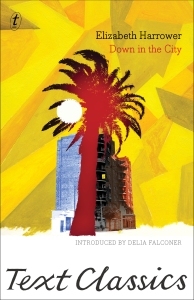
Down in the City is book one of my immersion into the works of Elizabeth Harrower, whereby I am reading her novels in order of publication and will finish with her short story collection.
July 28, 2025
Book Review: The Coast Road by Alan Murrin
It’s 1994 in County Donegal, Ireland, and everyone is talking about Colette Crowley – the writer, the bohemian, the woman who left her husband and sons to pursue a relationship with a married man in Dublin. But now Colette is back, and nobody knows why.
Returning to the community to try and reclaim her old life, Colette quickly learns that they are unwilling to give it back to her. The man to whom she is still married is denying her access to her children, and while the legalisation of divorce might be just around the corner, Colette finds herself caught between her old life and the freedom for which she risked everything. Desperate to see her children, she enlists the help of Izzy, a housewife and mother of two, and the women forge a friendship that will send them on a spiralling journey – one toward a path of self-discovery, and the other toward tragedy.
Brilliantly observed from a sharp new literary talent, The Coast Road is a novel about a closed community and the consequences of daring to move against the tide.
Released May 2024
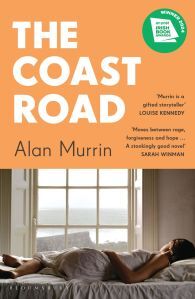 My Thoughts:
My Thoughts:I started The Coast Road on a Sunday morning and finished it by evening on the same day. I could not stop listening to it, that’s how much of a compelling read it is. A most impressive debut, that encapsulates a time and place within Ireland to perfection. Set in 1994, just prior to the second referendum on divorce in Ireland, the story orbits around the return of a ‘fallen woman’, Collette, who left her family and moved to Dublin for another man. Her return is the talk of the town, an unsettling ripple, yet Collette is a woman in despair, separated from her children, neither married nor divorced, entirely without rights and dependent on a husband she left.
This was such a restful, easy listening novel, yet also deeply thought provoking and desperately sad. The narration was beautifully executed; this one is most certainly in my top five of brilliant audiobook experiences. As you are pulled deeper and deeper into the story, the pain within the lives of the women who were the central characters in this one began to leak out and make itself felt.
What this novel does so well and with such subtlety, is demonstrate the catastrophic effects that not having an option to divorce can have on a society. Men and women who are so unhappy and incompatible, they become nothing more than toxic vessels butting up against each other, the children within these homes exposed to this as normalised behaviour, thus perpetuating the cycle generationally. Violence, the withholding of children, substance abuse, affairs. None of these things are that which should be protected under the guise of preserving the sanctity of marriage.
‘The only thing that seemed to offer her comfort was the lesson she had taken from Collette. That acceptance was not the same as resignation.’
This novel moved in a direction that I hadn’t anticipated, and it was deeply affecting. I loved how the author unspooled this for the reader, it was both something you didn’t see coming but was also inevitable in every way. I know I will be thinking of this novel for some time, and I have already recommended it to my book club. Alan Murrin is a most welcome addition to the stable of brilliant Irish writers and I look forward to reading what he releases next.



